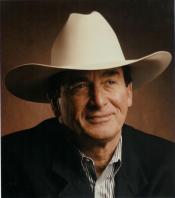Come all ye Texas Rangers wherever you may be.
I'll tell you of some troubles that happened unto me.
My name is nothing extra, so that I will not tell.
And here's to all you Rangers, I'm sure I wish you well.
Was at the age of seventeen I joined the jolly band.
We marched round San Antonio down to the Ryo Grande.
Our Captain, he informed us, perhaps he thought it right.
Before we reach the station boys, you'll surely have to fight.
And when the bugle sounded our Captain gave command.
To arms, to arms he shouted, and by your horses stand.
I saw the smoke ascending; it seemed to reach the sky.
And then the thought it struck me, my time had come to die.
I saw the Indians coming; I heard them give a yell.
My feelings at that moment no human tongue can tell.
I saw their glittering lances, their arrows ‘round me flew.
And all my strength had left me, and all my courage too.
We fought for nine hours fully, before the strife was o’er.
The likes of dead and wounded, I never saw before.
And when the sun had risen, and the Indians they had fled.
We loaded up our rifles and counted up our dead.
And all of us were wounded, our noble Captain slain.
The sun was shining sadly across that bloody plain.
Sixteen, the brave Rangers that never roamed the west,
Were buried by their comrades with arrows in their breast.
And now my song is ended, I guess I've sung enough.
The life of any Ranger you see is very tough.
And if you have a Mother that don't want you to roam.
I'd advise you by experience, you'd better stay at home
I'll tell you of some troubles that happened unto me.
My name is nothing extra, so that I will not tell.
And here's to all you Rangers, I'm sure I wish you well.
Was at the age of seventeen I joined the jolly band.
We marched round San Antonio down to the Ryo Grande.
Our Captain, he informed us, perhaps he thought it right.
Before we reach the station boys, you'll surely have to fight.
And when the bugle sounded our Captain gave command.
To arms, to arms he shouted, and by your horses stand.
I saw the smoke ascending; it seemed to reach the sky.
And then the thought it struck me, my time had come to die.
I saw the Indians coming; I heard them give a yell.
My feelings at that moment no human tongue can tell.
I saw their glittering lances, their arrows ‘round me flew.
And all my strength had left me, and all my courage too.
We fought for nine hours fully, before the strife was o’er.
The likes of dead and wounded, I never saw before.
And when the sun had risen, and the Indians they had fled.
We loaded up our rifles and counted up our dead.
And all of us were wounded, our noble Captain slain.
The sun was shining sadly across that bloody plain.
Sixteen, the brave Rangers that never roamed the west,
Were buried by their comrades with arrows in their breast.
And now my song is ended, I guess I've sung enough.
The life of any Ranger you see is very tough.
And if you have a Mother that don't want you to roam.
I'd advise you by experience, you'd better stay at home
inviata da Piersante Sestini - 28/8/2016 - 17:11
×
![]()


Si tratta di una canzone tradizionale, probabilmente degli inizi del XX secolo.
Un ragazzo di 17 anni si arruola entusiasta nei Texas Rangers (un piccolo gruppo militare d'élite che ebbe un ruolo rilevante nelle guerre indiane contro Comanche e Cherokee alla metà del XIX secolo), ma impara già alla prima missione l'orrore della guerra: assaliti e terrorizzati dagli indiani, dopo 9 ore di combattimento non c'è nessuno che non sia ferito al mattino, quando gli indiani si sono ritirati, seppelliscono 16 morti, incluso il capitano, col petto trafitto di frecce.
Termina con l'invito ai suoi coetanei a lasciar perdere e restare a casa.
Incisa da molti cantanti, la versione più nota è probabilmente quella cantata "a cappella" (solo vocale) di Ian e Silvia nell'album "Northern Journey", 1964
Anche notevole è la versione di Peter Rowan e Jerry Douglas nell'album Yonder (1996)